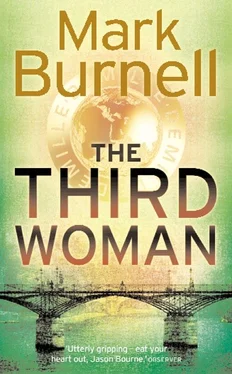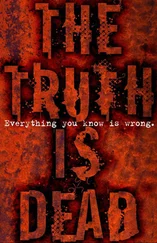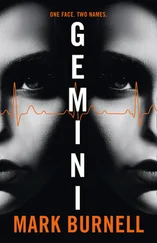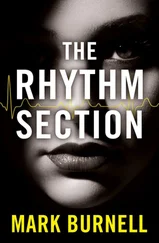1 ...6 7 8 10 11 12 ...24 Behind her now, the same voice again. ‘Henri! Watch out! She’s coming your way! She’s got a gun …’
What gun?
Movement grew in the dimness ahead. Petra entered the smoking remains of a boutique; retro-punk T-shirts, studded leather mini-skirts, frayed tartan hot-pants, a severed hand with a silver thumb-ring. She dragged a sloping chunk of partition wall from across the doorway at the back.
‘ Shit – Didi, you asshole! I nearly shot you! Where is she?’
More coughing. ‘I don’t know. Maybe you passed her …’
‘In there!’ cried a third voice. ‘ Look! ’
There was a single shot as Petra plunged into more darkness. She felt the thud of a bullet hitting a panel of MDF to her left. She came to a shoulder-wide passage with stairs to her right. Up to the first floor, a cramped storage area, the ceiling less than a foot taller than she was. The blast had blown the glass from the internal window overlooking the passage. She could hear them arguing below.
No weapon. No way out .
Except for the window. She approached the hole cautiously. Just above her was a web of iron struts, pipes and rubber cable, all of it ancient. Through the dust-haze she watched the four men beneath her. They were looking into the blackened shell of the boutique, shouting at those who’d followed her inside.
No choice, so no need to think about it. Up on to the sill and out on to the ledge, the remaining fragments of glass in the window-frame nibbling the palms of her right hand. There was a rusting water-pipe above her head. She gave it a quick tug; it seemed secure. She held on to it and swung, her toes catching the corner of a sturdy junction box, one of six bolted to a panel, cables spewing from them like black spaghetti.
‘Up there!’ bellowed a man below. ‘ Quick! ’
But not quick enough. She was already over the ledge above, propelling her body through a mesh of twisted metal ribs. On the roof, she gauged the way the passages worked, the ridges, the intersections. Most of the glass had gone. To her left, thick black smoke was curling skywards, the flames beneath undeterred by the rain.
It was slippery underfoot, years of grime given gloss by the downpour. She tried to work out where rue Saint Denis was so that she could head in the opposite direction. It wasn’t obvious from the backs of the surrounding buildings but there was a gap so she headed for that. The roof tapered to a short stretch of crumbling wall that abutted a taller building; apartments from the first floor up, a business at street level, the shutters pulled down over the windows.
She took the drainpipe to the first floor, swiping three potted plants from a window-ledge, then lowered herself on to the roof of a white Renault Mégane that was parked on the pavement.
Now she was in a small triangular square: rue Saint Spire, rue Alexandrie, rue Sainte Foy. She took Sainte Foy.
Five-past-two, the sirens now a long way behind her. She was still walking, the rain still falling. And helping. Under the circumstances, better to be drenched than dirty. Which was all the logic she could handle.
Head for Gare du Nord. Use the return ticket. Go home, have a shower, catch the plane. Worry about it over a cocktail on the beach .
She was sorely tempted yet knew she couldn’t. Stations were out. So was home. Which meant Marianne Bernard’s integrity was suspended. And it was Marianne’s name on the air ticket.
How had the police got there so quickly? How had they identified her so quickly? And the order to shoot – because she was armed – what did that mean?
One part of her wanted to stop and think. To collate. But another part of her wouldn’t let her. She had to keep moving. That was the priority.
Never stop. The moment you do …
Three-thirty-five. The cinema provided a temporary sanctuary of darkness. The film was a Hollywood romantic comedy, predictably short on romance, utterly devoid of comedy. Stephanie waited until the main feature had started before going to the washroom. She peeled off her denim jacket and the black polo-neck. Both were soaked. The long-sleeved strawberry T-shirt beneath was stuck to her skin. She filled a basin with warm soapy water, rolled up the sleeves to the elbow, scrubbed her face, hands and arms, rinsed, refilled the basin with clean warm water and dipped her head into it, before trying to claw some order through her hair.
A little cleaner but still dripping, she locked herself into one of the stalls, hanging the jersey and jacket on the door-peg. She lifted the T-shirt, examined her torso and ran her fingertips over as much of her back as she could. Nothing but a few cuts and grazes. She pulled down the toilet lid, sat on it, pulled off a dark grey Merrell shoe and checked the right ankle; swollen, tender to the touch, but no significant damage. When she envisaged Béatrice it seemed little short of a miracle. And all because of Petra; Stephanie would have stayed at the table for Jacob Furst.
She pulled on her wet clothes and checked her possessions; the return portion of her train ticket, Marianne’s credit-cards, a Belgian driving licence, flat keys, six hundred and seventeen euros in cash, mobile phone, cinema ticket.
Stephanie returned to the comforting dark of the auditorium, taking a seat near the back, and was grateful for the stuffy warmth. First things first, a plan of action. The primary urge was to run. And she would run. As she had in the past. That was the easy part. Nobody ran as effortlessly as Petra. But she couldn’t allow fear to be the fuel. Before that, however, there were questions.
She rose into the ethnic melting-pot of Belleville. The pavement along the eastern flank of the broad boulevard de Belleville was busy. Stephanie weaved through Afghans, Turks, Iranians, Georgians, Chinese. A group of five tall Sudanese were arguing on the corner of rue Ramponeau. A Vietnamese woman barged past her dragging a bulging laundry bag. Traffic was stationary in both directions, frustrated drivers leaning on their horns.
Stephanie switched on her mobile. No messages and no missed calls since she’d turned it off twenty minutes after clearing Passage du Caire. She return-dialled Jacob Furst’s number. No answer. She switched the phone off again and walked up rue Lémon to rue Dénoyez. The five-storey building was on the other side of the road. At street level, the Boucherie Shalom was closed. The restaurant next to it was open but Stephanie couldn’t see any diners through the window.
The Fursts’ apartment was on the third floor. No lights on, the curtains open. There were weeds sprouting from the plaster close to a fracture in the drainpipe. There was no building to the right. It had been demolished, the waste ground screened from the street by a barricade of blue and green corrugated iron.
She ventured left, away from the building, heading up the cobbled street past graffiti and peeling bill posters, past the entrance to the seedy Hotel Dénoyez – rooms by the hour – until she came to rue Belleville. Then she made a circle and approached rue Dénoyez from the other end at rue Ramponeau.
The Furst family had a Parisian lineage stretching back two centuries. In that time, there had been two constants: a family business centred on the garment industry and active participation within the Jewish community. Which included living among that community. And here was the proof. On rue Ramponeau, Stephanie stood with her back to La Maison du Taleth, a shop selling Jewish religious artefacts. Restaurants and sandwich shops all displayed with prominence the Star of David.
She returned to boulevard de Belleville. From the France Télécom phonebooth by the Métro exit she rang the police. An incident to report, some kind of break-in, she told them. She’d heard noises – screams for help, breaking glass, a loud bang – and now nothing. Please hurry – they’re an old couple. Vulnerable …
Читать дальше












